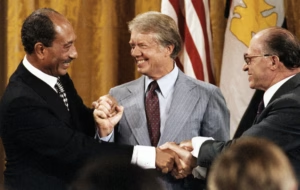Peace with Jordan and Egypt
Egypt and Jordan were the first Arab countries to accept Israel’s right to exist. The peace agreements were signed with the support of the United States, whose president now demands that these countries accept Palestinians currently residing in Gaza.

Egyptian President Anwar Sadat signed a peace treaty with Israeli PM Menachem Begin in September 1978. On October 6, 1981, Sadat was murdered by a member of Egyptian Islamic Jihad. Photo: Jimmy Carter Library
After Israel declared independence in May 1948, following the UN decision on November 29, 1947, neighbouring Arab states launched an attack to destroy the newly formed state. The Arab countries lost but continued to wage several wars to prevent Israel’s existence. This hostile status still persists today, as 15 members of the Arab League and ten non-Arab members of the Organization of Islamic Cooperation have still not recognized Israel’s right to exist.
For example, Israel and Saudi Arabia have never had formal diplomatic relations, and the Saudis still do not recognize Israeli sovereignty over its own land. Just before Hamas’ massacre in October 2023, there were indications that Saudi Arabia might consider recognizing the Jewish presence in the region, but after the outbreak of war between Israel and Hamas, Saudi Arabia halted the negotiations.
Not even war-torn Lebanon, which was drawn into the conflict with Israel as the PLO and Hezbollah have used its territory as a base for attacks against Israel, has made peace with its southern neighbour. Since there is no peace treaty between Lebanon and Israel, individuals with Israeli stamps in their passports may find it difficult to enter Lebanon.
Jordan supported the UN decision
Jordan’s King Abdullah was the only Arab leader to support the 1947 UN decision. The king advocated for the Arab areas of the British Mandate of Palestine to be annexed to Transjordan because he preferred a Jewish state as a neighbour to a Palestinian-Arab state that would be governed by the Hitler-allied Grand Mufti Haj Amin al-Husseini, according to historian Benny Morris in his book 1948: The History of the First Arab-Israeli War (2008).
On July 20, 1951, King Abdullah was assassinated at the Al-Aqsa Mosque in Jerusalem by a Palestinian in the circles close to the former Grand Mufti, who was also linked to the Muslim Brotherhood.
During the nearly 20 years (1948–1967) that Egypt occupied Gaza and Jordan occupied Judea and Samaria (the West Bank), there were virtually no Arab demands for a Palestinian state.
Egypt and Jordan were the first two Arab countries to make peace with Israel. Egypt’s President Anwar Sadat visited Israel in 1977 and made a speech in the Knesset. The following year, negotiations began between the countries, resulting in a peace agreement in which Egypt recognized Israel’s right to exist, while Israel returned the Sinai Peninsula, which it had taken during the Six-Day War in 1967.
Sadat murdered
The treaty between Israel and Egypt mentioned Palestinian self-governance in the West Bank and Gaza, which later became the foundation for the Oslo Accords. Sadat’s peace treaty with Israel enraged Islamists, particularly Egyptian Islamic Jihad and on October 6, 1981, Sadat was murdered by a member of the group.
In the mid-1980s, the United States proposed linking the West Bank to Jordan, but Jordan and the PLO instead suggested establishing a Palestinian state in the West Bank as a confederation with Jordan. These proposals faded, and in 1988, Jordan relinquished its claims to the West Bank, paving the way for negotiations between Israel and the PLO. The Madrid Conference in 1991 led to closer relations between the PLO and Israel, eventually culminating in the Oslo Accords in 1993.
As a result of the Accords, Israel’s Prime Minister Yitzhak Rabin and PLO leader Yasser Arafat reached a peace agreement that included holding elections in the West Bank and Gaza to establish a Palestinian Authority with limited self-rule.
Pressure from the US
After the Oslo Accords, Israeli Prime Minister Rabin was assassinated in 1995 by a right-wing extremist Jewish activist. Benjamin Netanyahu, a vocal opponent of the Oslo Accords, was subsequently elected prime minister, which led to the gradual collapse of the agreement.
Israel’s treaties with Egypt, the PLO, and Jordan came under significant pressure from US presidents such as Jimmy Carter and Bill Clinton. From 2020 onwards, Israel then signed peace agreements with the United Arab Emirates, Bahrain, Morocco, and Sudan under the Abraham Accords, brokered by Donald Trump.
Re-elected U.S. President Donald Trump has stated that he intends to relocate Palestinians from the Gaza Strip and that the U.S. would “take over” the enclave and turn it into the “Riviera of the Middle East.” He also warned that Jordan and Egypt could lose U.S. financial aid if they refuse to accept Palestinians from Gaza into their countries.
This proposal has been categorically rejected by Arab world leaders.



